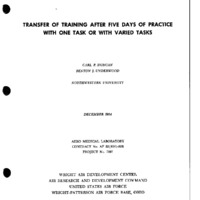-
Title
-
Transfer Of Training After Five Days Of Practice with One Task Or with Varied Tasks
-
Date
-
1954
-
Index Abstract
-
Not Available
-
Photo Quality
-
Not Needed
-
Report Number
-
WADC TR 54-533
-
Creator
-
Duncan, Carl P.
-
Underwood, Benton J.
-
Corporate Author
-
Northwestern University
-
Laboratory
-
Aero Medical Laboratory
-
Extent
-
19
-
PB Number
-
PB133525
-
Identifier
-
AD0062687
-
Access Rights
-
Unknown
-
Distribution Classification
-
1
-
DTIC Record Exists
-
No
-
Distribution Change Authority Correspondence
-
AFWAL LTR
-
Distribution Conflict
-
Fix
-
Abstract
-
Transfer among perceptual-motor paired-associate tasks was studied as a function of constant and varied training conditions. Over five days of training, one group practiced the same task every day (constant training), while training was varied for two other groups. One of these groups practiced 10 different tasks, two tasks each day; the other group practiced 10 different pairings of the stimuli and responses of the same task, two pairings each day. Following training, all groups were tested for transfer to four additional tasks. Neither method of training yielded transfer superior to constant training. There was no exception to this finding with any of the four transfer tasks on any of the transfer days. Two previously reported experiments have presented transfer data from groups for which the training period was respectively 10 days and two days. When training extended over 10 days, varied training produced better results than constant-training, but not when only two days of training were given. It was suggested that the difference in results between these earlier studies was due to the difference in level of mastery attained on the training tasks, the level being considerably higher with 10 days than with two days of training. The results given in the present report show that the medium level of mastery of training tasks attained during the five-day training period also did not produce superior transfer for groups of varied training. The results of this and the earlier reports again imply that if training task variations are introduced into training devices, the number of such variations should be as such to permit attainment of a high level of mastery on each within the available training time. Otherwise, there may be no advantage in varied training.
-
Report Availability
-
Full text available
-
Date Issued
-
1954-12
-
Provenance
-
Hunt Library, Embry-Riddle Aeronautical University
-
Type
-
report
-
Format
-
1 online resource
 WADCTR54-533.pdf
WADCTR54-533.pdf